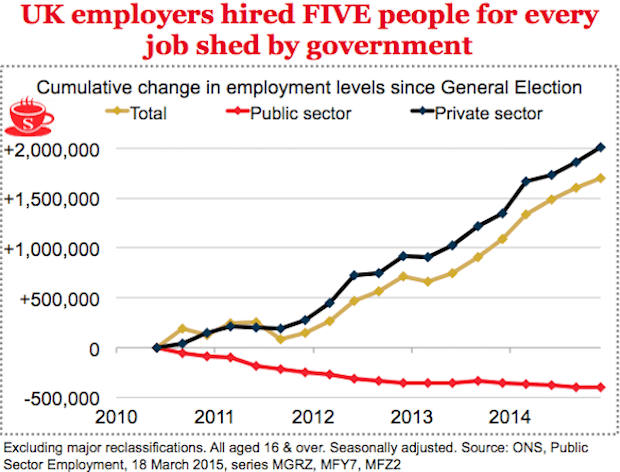Who is to blame for Ed Miliband getting the job projections so embarrassingly wrong? Famously, he used to go about advocating his ratio of doom: that there would be one private sector job lost for every state sector job shed by the coalition. Given that George Osborne intended to shed half a million government jobs, Miliband’s maths predicted a million jobs lost. Instead there were two million created – with 5 jobs created for every 1 shed by the government.
His employment spokeswoman, Rachel Reeves, was challenged about this today in the welfare debate on BBC Two’s Daily Politics. She replied: ‘We were quoting numbers from the independent Office for Budget Responsibility… So the Office for Budget Responsibility got that wrong.’ Really?
It was October 2010 when Miliband told the Scottish Labour conference that
“Cuts will mean half a million jobs lost in the public sector over the coming years. A similar number in the private sector.”
His bizarre forecast was made in defiance of the OBR projections. In June 2010, the OBR forecast 500,000 state jobs lost but 1.6 million private jobs created. So even back then, the OBR forecast three private jobs created for every state job lost. And yes, it was wrong: the ratio ended up being five-to-one.
[datawrapper chart=”http://static.spectator.co.uk/W36fb/index.html”]
So Reeves was wrong to blame the OBR for Miliband’s million-jobs-lost scaremongering. His figure showed only the scale of Labour’s misjudgment, and its bizarre idea that all prosperity stems from the state.
Things grew a little heated when Iain Duncan Smith debated Jonathan Bartley, his counterpart in the Green Party. 'You say that you’re a Christian!' said IDS, at one point. Bartley had just sought to lay 60 suicides at the door of the DWP – and, ergo, at the door of the Tories. The DWP was investigating, he said, what outcome? Were the deaths linked to his reforms? IDS replied that welfare changes have 'improved the quality of life for all sorts of people... what a scurrilous point to make.'







Comments